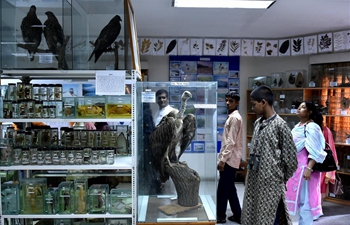LOS ANGELES, July 18 (Xinhua) -- Women who were employed from an earlier age experience slower memory decline when they age, scientists said here Tuesday at the Alzheimer's Association International Conference (AAIC) 2019.
Elizabeth Rose Mayeda, assistant professor of epidemiology at University of California at Los Angeles Fielding School of Public Health, and her team studied 6,386 American women born between 1935 and 1956.
The researchers found that women who were employed from between early adulthood and middle age, despite being mothers or otherwise, experienced slower memory decline later in life than when compared with women who did not work.
Rate of memory decline was quickest among women who had never been in employment, according to the study.
The researchers said jobs can offer women benefits including mental stimulation, financial benefits and social connections, all of which could limit decline in memory as they age.
"Though preliminary, our research provides evidence that participation in the paid labor force may help prevent late-life memory decline among women in the United States," said Mayeda.
"Future research should evaluate whether policies and programs that facilitate women's full participation in the paid labor force are effective strategies to prevent memory decline," she added.
Two-thirds of people living with Alzheimer's disease in the United States are women, according to the Alzheimer's Association's 2019 Alzheimer's Disease Facts and Figures report.
A longheld view has been that more women than men have Alzheimer's or other forms of dementia because women have longer life expectancy on average. But new evidence reported at the conference suggested that may not be the entire story.
"The research reported today at AAIC gets us one step closer to answering that question by identifying specific biological and social reasons why Alzheimer's is different in men and women," said Maria C. Carrillo, chief science officer of Alzheimer's Association.
Researchers at the University of Miami analyzed genes in around 30,000 people and found 11 different genes which have gender-specific associations with Alzheimer's disease risk.
"This research demonstrates that genetics may contribute to differences in risk and progression of Alzheimer's disease between men and women," said Brian Kunkle, genetic epidemiologist and associate scientist at the University of Miami. "More research is needed to understand how much these genes contribute to Alzheimer's risk, and whether they can be used to specifically identify men and women at risk for this disease."
In addition, researchers at University of California, San Diego found that women's brains fared better at metabolizing glucose than men despite similar signs of early to moderate Alzheimer's.
This suggests that women may fare better than men in compensating for early-stage Alzheimer's-related brain changes and may contribute to women's verbal memory advantage at this stage of the disease.













